Super User
Clearwater Paper Launches NuVo® with BioPBS™ Cup

Clearwater Paper Corporation (NYSE: CLW) has just introduced NuVo® withBioPBS™, a sustainable cup stock that provides foodservice operators with a compostable alternative to hot cups coated with low-density polyethylene.
NuVo® withBioPBS™ is the first cup stock to combine a compostable barrier, 35% post-consumer fiber, Forest Stewardship Council® (FSC®) chain-of-custody certification (FSC-C008402), and a high-definition print surface.
“When we launched the NuVo® brand in 2019, we made a promise to continually innovate to maximize product differentiation and sustainability. We are pleased to continue delivering on that commitment by introducing NuVo® withBioPBS™, a next-generation cup stock that we believe will allow our customers to be at the forefront of growing trends in sustainability,” said Steve Bowden, senior vice president and general manager of the pulp and paperboard division.
You can find additional information about NuVo® on the Clearwater Paper website at Clearwater Paper Corporation - Paperboard Products.
ABOUT BioPBS™
BioPBS™ is supplied to Clearwater Paper by Mitsubishi Chemical Corporation and PTTMCC Biochem Company Limited, a 50-50 joint venture between MCC and PTT Global Chemical Public Company Limited.
ABOUT CLEARWATER PAPER
Clearwater Paper is a premier supplier of private-branded tissue to major retailers, including grocery, drug, mass merchants and discount stores. In addition, the company produces bleached paperboard used by quality-conscious printers and packaging converters, and offers services that include custom sheeting, slitting, and cutting. Clearwater Paper's employees build shareholder value by developing strong relationships through quality and service.
FORWARD-LOOKING STATEMENTS
This press release contains certain forward-looking statements within the meaning of the Private Securities Litigation Reform Act of 1995, as amended, including statements regarding product quality, attributes, and development; sustainability and customers. These forward-looking statements are based on current expectations that are subject to change, and actual results may differ materially from the forward-looking statements. Factors that could cause actual results to differ materially include those risks and uncertainties described from time to time in the company's public filings with the Securities and Exchange Commission. The company does not undertake to update any forward-looking statements based on new developments or changes to the company’s expectations.
For additional information on Clearwater Paper, please visit our website at www.clearwaterpaper.com.
Mondi’s successful partnerships and 14 marketing awards for its PERGRAPHICA® brand
Mondi, a global leader in packaging and paper, is proud of the successful partnerships it has established for marketing its PERGRAPHICA® brand. PERGRAPHICA® is Mondi’s premium paper range for the creative design, publishing and luxury packaging markets.
- Mondi’s Catching Feels campaign won 14 B2B marketing awards in 2021
- Mondi, Adobe Stock and artist Rachael Presky collaborate on educational webinars for the creative industry
- Mondi has built a strong distribution network for PERGRAPHICA® across Europe
- Mondi’s entire PERGRAPHICA® range is CO2-neutral since April 2021
“We are incredibly proud of the overwhelming feedback we have received from our partners, including Adobe Stock, for PERGRAPHICA® and our Catching Feels campaign. There are a lot of shared values between Adobe Stock and PERGRAPHICA®. Adobe Stock´s motto of inspiring creatives and ‘Say it with Adobe Stock’ are very similar to PERGRAPHICA®’s own ‘Creatives inspiring creatives’”, says Johannes Klumpp, Marketing & Sales Director at Mondi Uncoated Fine Paper.
14 prestigious B2B marketing awards for Catching Feels, the PERGRAPHICA® campaign
Mondi’s Catching Feels campaign, developed in a unique digital to analogue partnership with Adobe Stock, has garnered no less than 14 B2B marketing awards. Among these are:
- 3 awards at the B2B Marketing Awards, the largest and most prestigious marketing awards in the B2B arena. Catching Feels won Gold for Best Brand Initiative, Silver for Best Creative Campaign and Silver for Most Commercially Successful Campaign.
- At the Global ACE Awards, recognising the best-of-the-best in B2B creative achievement from across the globe, Catching Feels came first in the category ‘Integrated Marketing Campaigns – $250,000-$1 Million Budget’.
- At the Drum Awards for the Digital Industries 2021, Catching Feels won the closely contested B2B category in recognition of its ‘digilogue’ approach.
The campaign launched in autumn 2020 transitions seamlessly between the screen and PERGRAPHICA® papers. QR codes take readers from the printed page onto a dedicated digital platform for paper lovers, pergraphica.com, complemented by virtual events for creatives, printers and publishers.

Collaboration with Adobe Stock and artist Rachael Presky in support of the creative industry
Celebrating the success of Catching Feels, Mondi hosted a session at Adobe Max 2021 in late October, Adobe’s virtual conference connecting creatives from around the world. The session entitled ‘Catching Feels: A Sensory Journey from Screen to Print’ gave creatives an exclusive look behind the scenes of Mondi’s successful, multi-award-winning integrated marketing campaign.
Additionally, Mondi is collaborating with Rachael Presky, UK-based illustrator and contributor to the Adobe Stock Premium Collection, a premium stock image library enhancing creative projects and empowering creatives. Experts from Mondi have been joining forces with Rachael Presky to offer educational and inspirational webinars on the creative journey from the screen to the printed page. Rachael is one of six artists chosen to contribute to the Catching Feels campaign for their ability to bring feelings to life in their creative work.
Mondi’s strong distribution network offering PERGRAPHICA® to creative design, publishing and luxury packaging markets across Europe
Mondi has deepened its collaborations with distribution partners to enhance availability of PERGRAPHICA® papers across Europe. The new Dark & Deep Colours and Infinite Black products in particular have received very positive feedback and won over new customers, marking Mondi’s successful entry into the luxury packaging market. In addition to the PERGRAPHICA® white design shades, Europapier has been offering the PERGRAPHICA® Dark & Deep Colours range in Austria, Eastern Europe and the Ukraine since late 2020. Distribution partners for Germany are IGEPA and Antalis. In the UK, France and Switzerland, Antalis offers the full white range including SRA3 and Indigo.
“We have a long-standing partnership with Mondi. The new PERGRAPHICA® Colours for creative design and luxury packaging are a fantastic addition to our portfolio for German customers. We value our collaboration with Mondi, in particular the training and support their packaging team provides for our staff here at IGEPA”, says Sabine Reister, Product Manager Paper & Print at the IGEPA Group.
Since April 2021, Mondi’s entire PERGRAPHICA® range has been CO2-neutral thanks to an internationally recognised carbon offset project run by ClimatePartner. All PERGRAPHICA® shades, surfaces and grammages are made in Austria and meet strict global sustainability standards according to FSCTM as well as the EU Ecolabel.
About Mondi Uncoated Fine Paper
Uncoated Fine Paper is a business unit of Mondi Group. In six operating sites in Austria, Slovakia, Russia, and South Africa, Mondi Uncoated Fine Paper produces pulp and environmentally sound office and professional printing papers tailored to the latest professional digital and offset print technologies. The company complies with the strictest international certification standards to support sustainable production processes through the responsible management of forest, water and air resources. All Mondi uncoated fine papers belong to the Green Range of papers that are FSC™ or PEFC™ certified, 100% recycled or bleached entirely without chlorine.
Its renowned brands such as Color Copy, PERGRAPHICA®, NAUTILUS®, NEUJET®, IQ, MAESTRO®, BIO TOP 3®, DNS®, Snegurochka or ROTATRIM are used in office environments on laser or inkjet printers and by professional printers on digital or offset presses to create brochures, transactional material, folders, invitations, business cards, letterheads or other high-impact communication. Converters appreciate the excellent printability and smooth handling of Mondi’s professional printing papers.
About Mondi
Mondi is a global leader in packaging and paper, contributing to a better world by making innovative packaging and paper solutions that are sustainable by design. Our business is integrated across the value chain – from managing forests and producing pulp, paper and plastic films, to developing and manufacturing effective industrial and consumer packaging solutions. Sustainability is at the centre of our strategy and intrinsic in the way we do business. We lead the industry with our customer-centric approach, EcoSolutions, where we ask the right questions to find the most sustainable solution. In 2020, Mondi had revenues of €6.66 billion and underlying EBITDA of €1.35 billion.
Mondi has a premium listing on the London Stock Exchange (MNDI), and a secondary listing on the JSE Limited (MNP). Mondi is a FTSE 100 constituent, and has been included in the FTSE4Good Index Series since 2008 and the FTSE/JSE Responsible Investment Index Series since 2007.
Resolute Announces Indefinite Idling of Pulp and Paper Operations at Calhoun, TN Mill
Resolute Forest Products Inc. (NYSE: RFP) (TSX: RFP) has just announced the indefinite idling of pulp and paper operations at its Calhoun (Tennessee) mill. Tissue manufacturing and converting will continue at the site and the adjacent distribution center will remain in full operation.
The company anticipates that the decision will directly affect 350 hourly and salaried positions at the Calhoun mill. The facility, which employs a total of 545 people, has an annual capacity of 147,000 metric tons of pulp and 149,000 metric tons of paper as well as 60,000 metric tons of premium tissue.
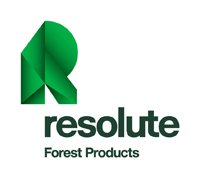 "We have taken the very difficult decision to indefinitely idle pulp and paper operations at Calhoun knowing how hard this is for the affected employees and their families," said Remi G. Lalonde, president and chief executive officer. "Success has proved elusive at Calhoun's pulp and paper operations, despite the best efforts of our dedicated employees and significant investments of time, energy and resources over the last few years."
"We have taken the very difficult decision to indefinitely idle pulp and paper operations at Calhoun knowing how hard this is for the affected employees and their families," said Remi G. Lalonde, president and chief executive officer. "Success has proved elusive at Calhoun's pulp and paper operations, despite the best efforts of our dedicated employees and significant investments of time, energy and resources over the last few years."
The company continues to accumulate significant financial losses at the mill, even with the current strong market conditions for both the pulp and uncoated freesheet paper it manufactures. On a trailing twelve-month basis ending September 30, the pulp and paper operations in Calhoun produced an operating loss of $62 million before corporate expense allocation, including a depreciation expense of $10 million. In addition to these financial losses, the Calhoun mill faced additional significant production upsets in November and December.
Once the indefinite idling is completed, the company anticipates an improvement in its overall operating income, of approximately $35 million to $40 million, which reflects the lost pulp integration benefit with its tissue manufacturing of approximately $15 million and approximately $5 million from on-going costs associated with closed site maintenance.
Pulp and paper operations will continue for up to 60 days to ensure an orderly shutdown, to accommodate environmental safeguards and to transition customers. "Our focus now will be to support our employees through this difficult time, to operate for the remaining period with the same degree of focus on safety and quality, and to facilitate a smooth transition for our customers," added Mr. Lalonde. "As business conditions for our tissue operations continue to improve after a challenging 2021, our priorities remain focused on driving performance progress to leverage the full potential of our converting operations and the quality of the paper from the machine, together with the right customer mix, to seize the upside, even as the lost integration benefit will add to pulp costs."
The company will work with union leadership and will apply the mill's collective agreement and applicable federal and state laws as well as provide severance benefits to those directly affected. Resolute will also engage government officials and other local authorities in an effort to mitigate the impact of the indefinite idling.
As a result of today's announcement, the company expects to record, in the fourth quarter, non-cash impairment and accelerated depreciation charges of approximately $135 million to reduce the carrying value of the pulp and paper fixed assets to their residual value, as well as a write-down of inventory and a write-off of other assets of approximately $32 million in total. The company also estimates cash closure costs of approximately $45 million, mainly related to decommissioning, severance and other termination benefits, and other costs. Most cash closure costs will be disbursed in 2022.
About Resolute Forest Products
Resolute Forest Products is a global leader in the forest products industry with a diverse range of products, including market pulp, tissue, wood products and papers, which are marketed in over 50 countries. The company owns or operates some 40 facilities, as well as power generation assets, in the United States and Canada. Resolute has third-party certified 100% of its managed woodlands to internationally recognized sustainable forest management standards. The shares of Resolute Forest Products trade under the stock symbol RFP on both the New York Stock Exchange and the Toronto Stock Exchange.
Resolute has received regional, North American and global recognition for its leadership in corporate social responsibility and sustainable development, as well as for its business practices. Visit www.resolutefp.com for more information.
SOURCE Resolute Forest Products Inc.
Toscotec TT SteelDryers started up at Omnia Advanced Materials in Italy.
Toscotec participated in the dryer section rebuild of PM2 at Omnia Advanced Materials Alife mill in Italy with the supply of 16 TT SteelDryers. PM2 produces highly customized specialty paper including gaskets, absorbency, and filtration media for numerous industrial and consumer applications.
Toscotec has designed and customized the new TT SteelDryers according to PM2 specifications, with a diameter of 1,250 mm, a trim width of over 2,300 mm, and an operating pressure of 10barg, and it applied a cover on many of the dryer cans to guarantee high cleanliness throughout the papermaking process following the press section. With their higher operating pressure, Toscotec’s TT SteelDryers, are set to improve PM2 performance, as they guarantee a higher specific evaporation rate, compared with the existing cast iron cans.
Francesco Giusti, Plant Manager at Omnia Advanced Materials, says: “We chose Toscotec for the steel dryers supply, because they were able to offer the best guarantees of quality and the highest number of references. Toscotec has achieved technological excellence in the design and manufacture of TT SteelDryers. Based on their reputation in the market, we are confident they will also provide professional solutions.”
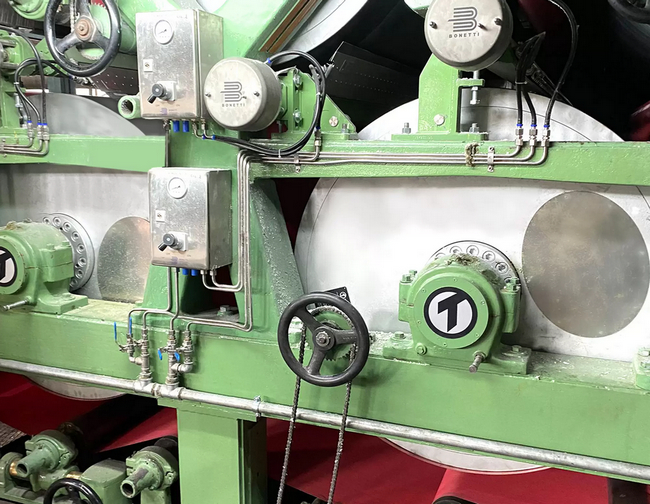
Enrico Fazio, Sales Director of Toscotec’s Paper & Board division, says, “It is important for Toscotec to strengthen its experience in the rebuild of machines manufacturing specialty papers. The size of these TT SteelDryers will be entirely customized following the specific requirements of Omnia Advanced Materials. It is the perfect opportunity for Toscotec to prove its flexibility and customer-oriented approach.”
About Omnia Advanced Materials
Founded in the 1950s by the Fronzoni family in Italy, Omnia Advanced Materials remains to this day a private company owned by Gino Fronzoni with operations in both Alife, Italy and Beaver Falls, NY, USA. It produces a wide range of tailor-made products including absorbent media (such as air fresheners, fragrant scent strips, humidity indicators), industrial filter applications in the F&B, pharmaceutical, chemical and automotive industries, and gasket material (for which they are a market leader manufacturing over 50 different types of sealing materials for commercial and industrial automotive, hydraulic applications, gas compressors, and other industrial applications).
For further information, please contact:
Enrico Fazio, Sales Director, Toscotec Paper & Board division, This email address is being protected from spambots. You need JavaScript enabled to view it.
Voith expands Papermaking 4.0 portfolio with three new apps for higher process stability and efficiency in paper production
Customers worldwide rely on Voith's modular Papermaking 4.0 portfolio to individually optimize their production with the leading digital industrial applications. Based on extensive expertise, Voith is introducing OnEfficiency.BreakProtect, OnView.VirtualSensorBuilder and OnView.MassBalance, three new apps on the IIoT platform OnCumulus. The new digitalization solutions feature the highest safety standards, are quick to install and easy to use. The technologies are already successfully implemented in several plants worldwide. Due to the process optimizations and lower resource consumption, the applications often pay off in less than a year and pave the way to the digital paper mill.
- OnEfficiency.BreakProtect: Detect, understand and prevent paper break causes
- OnView.VirtualSensorBuilder: Quickly and easily calculate and visualize relevant quality parameters in real time
- OnView.MassBalance: Visualize raw material losses in stock preparation and increase yields
OnEfficiency.BreakProtect: Detect, understand and prevent paper break causes
The IIoT platform OnCumulus has already established itself as a central hub for data from multiple sources for numerous paper manufacturers. OnEfficiency.BreakProtect uses artificial intelligence to analyze the process data bundled in OnCumulus. Thereby, the innovative solution automatically detects various critical process conditions that can lead to breaks. This allows the development of specific countermeasures and the reliable prevention of tear-offs.
"I am always fascinated by the correlations that artificial intelligence can recognize," says Jürgen Käser, Director Process Applications at Voith. "Among other things, we were able to use OnEfficiency.BreakProtect to identify increased dirt and starch agglomerate loads – for which there is no measurement data at all – at the SpeedSizer pulper. In the past, these had repeatedly led to break-off series. A small mechanical rebuild, which prevents starch from entering the pulper in larger quantities, has permanently solved the previously undetected problem."
OnView.VirtualSensorBuilder: Calculate and visualize quality parameters quickly and easily using virtual sensors
Virtual sensors, also called soft sensors, have proven themselves in the process industry for many years. With the help of data models, the sensors calculate various quality parameters and thus reliably supplement laboratory tests. Until now, the use of virtual sensors required considerable time and, above all, data analysis skills. With OnView.VirtualSensorBuilder, Voith introduces a user-friendly app that allows paper manufacturers to quickly and easily create the virtual sensors themselves with just a few mouse clicks.
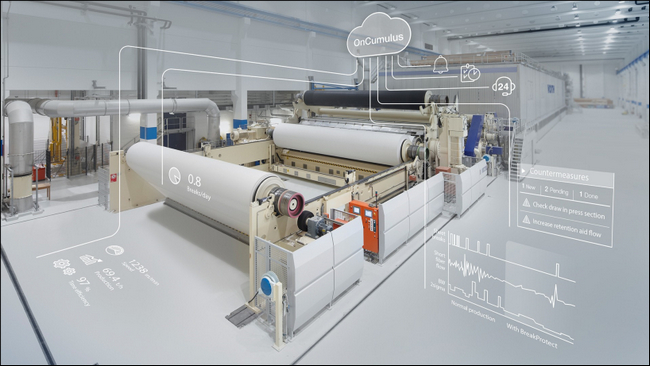
"With OnView.VirtualSensorBuilder, it only takes a few hours for a new soft sensor to be ready for use," says Maria Knauer, Global Product Manager Efficiency Solutions at Voith. "Previously, this required a time-consuming and costly process of several weeks."
Once installed, operators can use OnView.VirtualSensorBuilder to continuously calculate, visualize and control relevant quality values, such as strength values, in real time. Combined with OnCumulus.Suite, the digital application identifies critical values and provides preventive warnings, allowing personnel to make immediate improvement adjustments. The solution thus increases process stability, enables compliance with desired quality standards, reduces raw material costs and minimizes waste.
OnView.MassBalance: Visualize and reduce fiber losses in stock preparation
OnView.MassBalance maps the current stock flows in an intuitive Sankey diagram and provides information on deviations that are no longer within the standard range. If a defined warning threshold is exceeded, the application automatically highlights the relevant area in the diagram and recommends suitable action to avoid fiber losses. OnView.MassBalance thus leads to targeted process optimization in stock preparation and also enables centralized knowledge management.
With the help of OnView.DigitalEye, the accuracy of OnView.MassBalance can be increased even further. The innovation makes it possible for the first time to analyze recovered paper quality even before stock preparation with the help of artificial intelligence. The award-winning AI application OnView.DigitalEye is currently undergoing final testing as part of pilot installations at national and international customer sites and is expected to be available starting next year. Another application that will be launched in 2022 is OnView.Energy from Voith. The app visualizes and analyzes energy consumption and CO2 emissions in production. This enables significant savings potential to be identified, leading to lower energy costs, improved sustainability and competitiveness.
This release is part of the current "PAPER IS ON" campaign, in which Voith highlights the focus topics of the digital Papermaking 4.0 portfolio: full-line supplier, efficiency, sustainability, cloud solutions, automation and innovation. Learn more at voith.com/PaperIsOn. For more information on the solutions from the OnCumulus, OnView and OnEfficiency family as part of Voith's Papermaking 4.0 portfolio, please visit https://voith.com/corp-en/products-services/automation-digital-solutions/onefficiency.html. In addition, read more about OnView.DigitalEye receiving the AI Champions Award: https://voith.com/corp-en/news-room/press-releases/voith-wins-ai-champions-award-2021.html.
About the Voith Group
The Voith Group is a global technology company. With its broad portfolio of systems, products, services and digital applications, Voith sets standards in the markets of energy, paper, raw materials and transport & automotive. Founded in 1867, the company today has around 20,000 employees, sales of € 4.3 billion and locations in over 60 countries worldwide and is thus one of the larger family-owned companies in Europe.
The Group Division Voith Paper is part of the Voith Group. As the full-line supplier to the paper industry, it provides the largest range of technologies, services and products on the market and offers paper manufacturers holistic solutions from a single source. The company’s continuous stream of innovations facilitates resource-conserving production and helps customers minimize their carbon footprint. With its leading automation products and digitalization solutions from the Papermaking 4.0 portfolio, Voith offers its customers state-of-the-art digital technologies to improve plant availability and efficiency for all sections of the production process.
ANDRITZ successfully starts up the first of two tissue machines delivered to Guangxi Sun Paper, China
International technology group ANDRITZ has successfully started up one of the two PrimeLineTM W 2000 tissue machines delivered to Guangxi Sun Paper, China, for its mill in Beihai City, Guangxi Province.
The second tissue machine (TM6) is expected to be started up by the end of this year.
The tissue machine (TM5) has a design speed of 2,000 m/min, a working width of 5.65 m, and a capacity of 60,000 t/a. To enable energy-efficient production, it is equipped with a large suction press roll, an 18 ft. PrimeDry Steel Yankee with head insulation, and a re-evaporation system. For optimum end-product quality, forming fabrics and press felts by ANDRITZ Fabrics and Rolls were installed.
The scope of supply also included FibreSolve FSV pulpers, the paper machine approach flow systems as well as broke handling, fiber recovery, and automation systems.
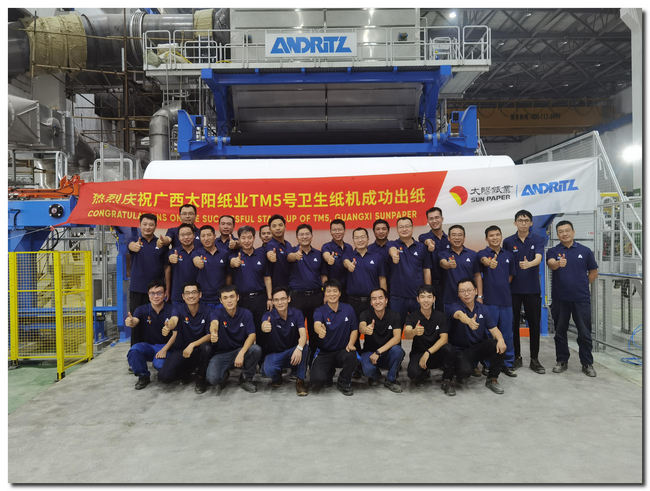 Successful start-up of the PrimeLineTM tissue machine (TM5) at Guangxi Sun Paper, China © ANDRITZ
Successful start-up of the PrimeLineTM tissue machine (TM5) at Guangxi Sun Paper, China © ANDRITZ
Ying Guangdong, Vice General Manager and Chief Engineer of the Sun Paper Group, says: “With more than 20 years’ of successful cooperation with ANDRITZ, we know their capabilities very well and rely on their innovative solutions for sustainable, high-quality tissue production. This project went smoothly and very swiftly, which shortened our payback time remarkably.”
Gary Beckingham, Vice President and General Manager for Asia in the Paper, Fiber and Recycling Division at ANDRITZ, adds: ”Due to the excellent teamwork, we succeeded in setting a new benchmark. It took only 12 months from project kick-off to the first paper on reel and only 10 days for start-up and commissioning. We always try our best to improve our customers’ profitability and increase their return on investment.”
Guangxi Sun Paper is part of the Sun Paper Group. It was founded in 2019 with the aim of establishing an integrated pulp and paper mill in Beihai City. The new greenfield mill will presumably have a total pulp and paper capacity of 3.5 million t/a and will be built in two phases over approximately four years.
ANDRITZ GROUP
International technology group ANDRITZ offers a broad portfolio of innovative plants, equipment, systems and services for the pulp and paper industry, the hydropower sector, the metals processing and forming industry, pumps, solid/liquid separation in the municipal and industrial sectors, as well as animal feed and biomass pelleting. Plants for power generation, flue gas cleaning, recycling, and the production of nonwovens and panelboard complete the global product and service offering. Innovative products and services in the industrial digitalization sector are offered under the brand name Metris and help customers to make their plants more user-friendly, efficient and profitable. The publicly listed group has around 26,800 employees and more than 280 locations in over 40 countries.
ANDRITZ PULP & PAPER
ANDRITZ Pulp & Paper provides equipment, systems, complete plants and services for the production of all types of pulp, paper, board and tissue. The technologies and services focus on maximum utilization of raw materials, increased production efficiency and sustainability as well as lower overall operating costs. Boilers for power generation, flue gas cleaning systems, plants for the production of nonwovens and panelboard (MDF), as well as recycling and shredding solutions for various waste materials also form a part of this business area. State-of-the-art IIoT technologies as part of Metris digitalization solutions complete the comprehensive product offering.
Leading paper manufacturers rely on Voith expertise for resource-efficient rebuilds and optimization projects to boost competitiveness
With its full-line supplier approach, Voith Paper strengthens position as partner of choice for extensive rebuilds and customized optimization projects. Shifting consumer demands, tougher environmental regulations and ongoing supply chain issues with raw materials have combined to create a perfect storm in the paper industry. To remain competitive in unprecedented conditions, leading papermakers around the globe are relying on Voith to modernize their existing paper production lines, undertake comprehensive grade conversions or upgrade their current assets in the market. As a full-line supplier, Voith realizes every type of rebuild to give paper machines a second life. In the process, Voith expertise, innovative components and advanced digital tools ensure customers achieve their efficiency and productivity targets with a lower capital investment.
Extensive grade conversion in Indonesia
In September 2021, Voith kicked off the grade conversion of Mojokerto MSE-PM2 for PT Mega Surya Eratama. The extensive rebuild will transform the former newsprint paper machine, which is currently out of service, to a state-of-the-art packaging production line at the company’s Mojokerto paper mill in East Java, Indonesia.
 As is the case with every rebuild, Voith is placing a special focus on high machine availability, technological efficiency, process stability and sustainability with the lowest possible energy balance for the plant. After conversion, the PM 2 will produce high-quality containerboard grades between 70 g/m² and 180 g/m², with a design speed of 1,400 m/min and 6,660 mm paper width at reel. After start-up, the XcelLine paper machine will have an annual production capacity of 450,000 tons, and, as a result, the PM 2 will be one of the most powerful paper machines of this grade in Indonesia. The Voith scope of supply includes a forming section rebuild into a DuoFormer CBh with shoe-blade technology, a new DuoCentri NipcoFlex Press and SpeedSizer AT film sizer for starch application. The order also includes a complete BlueLine stock preparation and approach flow line. The start-up after conversion is scheduled for the end of 2023.
As is the case with every rebuild, Voith is placing a special focus on high machine availability, technological efficiency, process stability and sustainability with the lowest possible energy balance for the plant. After conversion, the PM 2 will produce high-quality containerboard grades between 70 g/m² and 180 g/m², with a design speed of 1,400 m/min and 6,660 mm paper width at reel. After start-up, the XcelLine paper machine will have an annual production capacity of 450,000 tons, and, as a result, the PM 2 will be one of the most powerful paper machines of this grade in Indonesia. The Voith scope of supply includes a forming section rebuild into a DuoFormer CBh with shoe-blade technology, a new DuoCentri NipcoFlex Press and SpeedSizer AT film sizer for starch application. The order also includes a complete BlueLine stock preparation and approach flow line. The start-up after conversion is scheduled for the end of 2023.
“We were convinced by Voith’s capability as a full-line supplier to meet our highest benchmark and sustainability requirements for this strategic grade conversion,” says Eric Saputra, General Manager at PT Mega Surya Eratama. “Given their extensive experience and innovative equipment, Voith is ideally positioned to bring out the full potential of the PM 2 production line. We rely on Voith to support us in producing the highest paper quality on a machine with the best operational reliability.”
Record-breaking 30th shoe press rebuild
This year, Voith marked the 30th successful rapid shoe press rebuild in a row in China, with five more underway. The most recent was completed for the Sun Paper Group. As it took a mere seven days from shutdown to paper on reel, the project set a record for the fastest shoe press rebuild in the region, saving the customer valuable production time as a result. The centerpiece is a new NipcoFlex shoe press for the existing press section. In addition, the scope of delivery included a PLC control system for NFP, erection and start-up service as well as spare part and wear part packages. Previously, in December 2020, Voith successfully completed the rebuild and smooth start-up of the NipcoFlex shoe press on PM 9 for JiangXi WuXing, a leading paper manufacturer based in Jiujiang City.
Large-scale Voith rebuilds spread across the globe
Voith successfully provides full-line supplier support for large-scale rebuilds around the world, all of which have ambitious efficiency targets and productivity goals. In Spain, for instance, PAPRESA, the leading southern European manufacturer of newsprint, commissioned Voith for the resource-efficient grade conversion of PM 5 from newsprint paper to testliner and corrugating medium at the company’s Rentería mill. Papermaking 4.0 tools supports the company’s ambitious efficiency and sustainability goals. Other notable projects in Europe include the PM 2 rebuild for Schumacher Packaging, a corrugated board producer and full-range supplier of paper-based packaging solutions. The rebuild at the company’s Myszków site in Poland involves a forming section upgrade to DuoFormer D, a new headbox MasterJet Pro and DuoShake DG 800, which will ensure the necessary dewatering capacity and final paper quality. While in North America, Domtar, a leading U.S. paper manufacturer, has entrusted Voith to support the company’s entry into the containerboard market and set higher industry standards. At the company’s Kingsport mill in Tennessee, Voith is to install a BlueLine stock preparation line and perform the grade conversion of its production line.
“Drawing on our full-line supplier expertise, we provide the know-how and technology for rebuilds of every kind. Whatever the ultimate business and sustainability goals of an optimization project, our comprehensive approach ensures we are in a leading position to fully exploit the potential of existing paper production lines,” states Martin Jauch, Senior Vice President Global Rebuilds at Voith.
To discover more insights and updates on Voith solutions for rebuilds and optimizations projects, visit our website: https://voith.com/corp-en/industry-solutions/papermaking/rebuilds-and-optimization.html
About the Voith Group
The Voith Group is a global technology company. With its broad portfolio of systems, products, services and digital applications, Voith sets standards in the markets of energy, paper, raw materials and transport & automotive. Founded in 1867, the company today has more than 20,000 employees, sales of € 4.2 billion and locations in over 60 countries worldwide and is thus one of the larger family-owned companies in Europe.
The Group Division Voith Paper is part of the Voith Group. As the full-line supplier to the paper industry, it provides the largest range of technologies, services, and products on the market, and offers paper manufacturers integrated solutions from a single source. The company’s continuous stream of innovations facilitates resource-conserving production and helps customers minimize their carbon footprint. With its comprehensive automation products and leading digitalization solutions from the Papermaking 4.0 portfolio, Voith offers its customers state-of-the-art digital technologies to improve plant availability and efficiency for all sections of the production process.
ANDRITZ successfully starts up new COMPACT PRESS at BillerudKorsnäs’ Gruvön mill in Sweden
International technology group ANDRITZ has successfully started up the first ANDRITZ COMPACT PRESS wash press at BillerudKorsnäs’ Gruvön mill located in Värmland, Sweden.
Final acceptance was received in September 2021.
With its small footprint, high availability and extremely effective washing efficiency, the COMPACT PRESS is well known in the pulp industry. Successful start-up and completion of the project was a result of the ongoing, close cooperation between ANDRITZ and BillerudKorsnäs. ANDRITZ also supplied a DD-Washer, MC pumps and a pulp Screw Press for a new brownstock washing sideline in 2019.
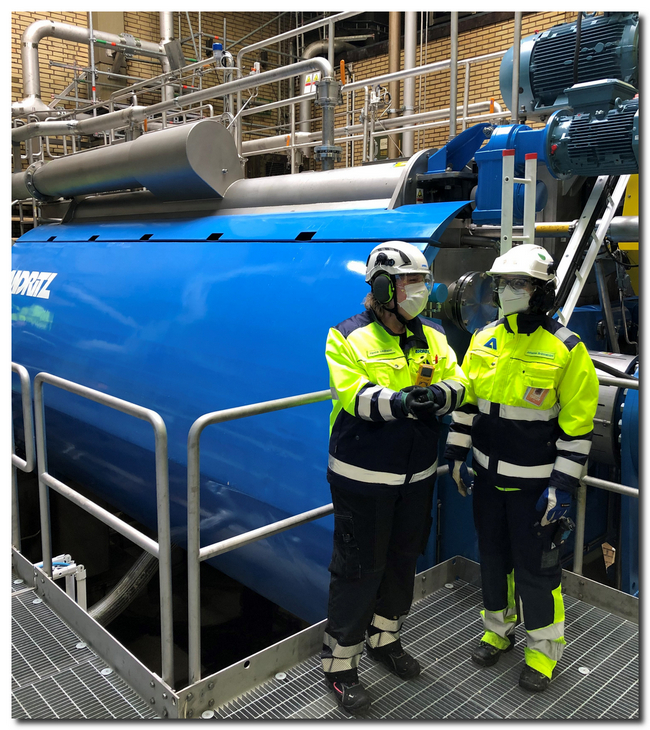 ANDRITZ’s start-up personnel next to the first ANDRITZ COMPACT PRESS wash press at BillerudKorsnäs’ Gruvön mill in Sweden © ANDRITZ
ANDRITZ’s start-up personnel next to the first ANDRITZ COMPACT PRESS wash press at BillerudKorsnäs’ Gruvön mill in Sweden © ANDRITZ
BillerudKorsnäs is a leading player for liquid packaging board and a global leader in the production of high-porosity sack paper manufactured from primary fibers. In Europe, the company holds a leading position for primary fiber-based kraft paper, fluting and pure white liner and is also one of the largest producers of cartonboard from primary fibers.
ANDRITZ GROUP
International technology group ANDRITZ offers a broad portfolio of innovative plants, equipment, systems and services for the pulp and paper industry, the hydropower sector, the metals processing and forming industry, pumps, solid/liquid separation in the municipal and industrial sectors, as well as animal feed and biomass pelleting. Plants for power generation, flue gas cleaning, recycling, and the production of nonwovens and panelboard complete the global product and service offering. Innovative products and services in the industrial digitalization sector are offered under the brand name Metris and help customers to make their plants more user-friendly, efficient and profitable. The publicly listed group has around 26,800 employees and more than 280 locations in over 40 countries.
ANDRITZ PULP & PAPER
ANDRITZ Pulp & Paper provides equipment, systems, complete plants and services for the production of all types of pulp, paper, board and tissue. The technologies and services focus on maximum utilization of raw materials, increased production efficiency and sustainability as well as lower overall operating costs. Boilers for power generation, flue gas cleaning systems, plants for the production of nonwovens and panelboard (MDF), as well as recycling and shredding solutions for various waste materials also form a part of this business area. State-of-the-art IIoT technologies as part of Metris digitalization solutions complete the comprehensive product offering.
The critical phase of the restructuring of the Slovenian paper mill Vipap Videm Krško
The critical phase of the restructuring of the Slovenian paper mill Vipap Videm Krško is coming to asuccessful end and the company is currently resuming production.
 One of the largest manufacturing companies in Slovenia, Vipap Videm Krško paper mills, is now entering a crucial part of the compulsory settlement process with its creditors and starting production of products for the pre-Christmas market. The success of the formal completion of the process depends on the approval of the plan by the secured creditors and the decision of the Municipal Court of Krško.
One of the largest manufacturing companies in Slovenia, Vipap Videm Krško paper mills, is now entering a crucial part of the compulsory settlement process with its creditors and starting production of products for the pre-Christmas market. The success of the formal completion of the process depends on the approval of the plan by the secured creditors and the decision of the Municipal Court of Krško.
The proceedings, initiated in September at the request of the mill's largest secured creditor, the Czech company VIPAP CZ, have allowed Vipap Videm Krško to go through debt restructuring and a review of operating costs and to prepare to resume production with a new product portfolio.
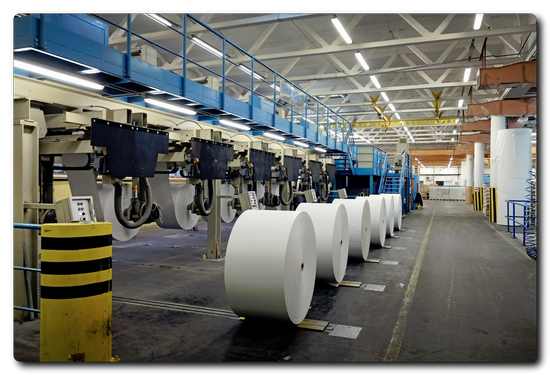
The recovered company will now focus primarily on the production of packaging materials, which is a highly promising area due, among other things, to the long-term increasing demand for environmentally friendly products across segments.
The compulsory settlement proceedings have been conducted in coordination with Vipap Videm Krško's new crisis management, headed by the paper mills' chairman of the board, Milena Resnik. In addition, the renewed management continues to have the full support of the investors under the company Vipap Holding umbrella, which was the sole shareholder of the mill prior to the restructuring. The investor group has supported the Vipap Videm Krško company for a long time and is convinced that the paper mill can embark on a path of long-term competitiveness and prosperity once the restructuring is completed and production resumes.
The investors’ representatives are striving for maximum cooperation with all the involved parties and expect a successful resumption of production at Vipap Videm Krško in the first days of December
Road to sustainability: Paper recycling is not enough
Recycling is just the beginning: In order to create a truly sustainable paper industry, both manufacturers and consumers need to improve the lifecycle of paper as a whole – and think outside the box along the way. Responsible forestry management and the reduction of energy consumption and greenhouse gas emissions in production all help to establish paper as a sustainable and climate-friendly material.
Which packaging material is the best in terms of sustainability? The general opinion on which material is the most environmentally friendly has changed throughout the decades, from paper to plastic back to paper. In the context of the sustainability movement, the popularity of paper is soaring due to its high recyclability. Despite increased efforts to recycle plastic, there is still a lot of room for improvement. Plastic packaging still consists of up to 89 percent virgin material. Glass appears as an attractive packaging material due to its high reusability, but there is a caveat: Melting glass for recycling purposes requires high temperatures, which in turn drive up energy consumption.
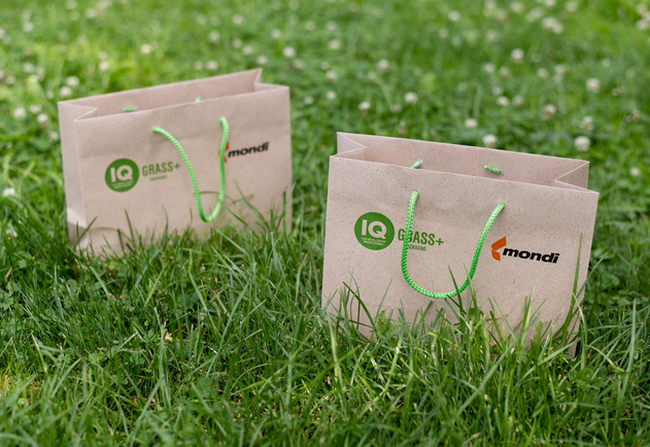
Opportunities and limitations of paper recycling
In Europe, over 73 percent of the paper on the market is recycled. This puts Europe almost at the natural recycling limit of around 78 percent. The remaining 22 percent is accounted for by books, hygiene products or important documents that are stored for a longer period of time. However, paper cannot be recycled an infinite number of times. After four to six life cycles, the fibres will become simply too short. Therefore, a certain amount of virgin fibre in circulation is necessary to continue recycling and thus keep the sustainability cycle going. However, there is also a life beyond waste paper for the paper fibres that are far too short; for instance, they can be recycled as environmentally friendly blow-in insulation material for buildings. The non-profit organisation Cepi (European association representing the paper industry), for example, is campaigning for a European waste policy that promotes the recycling of paper and improves the flow of recycled fibres into the supply chain.
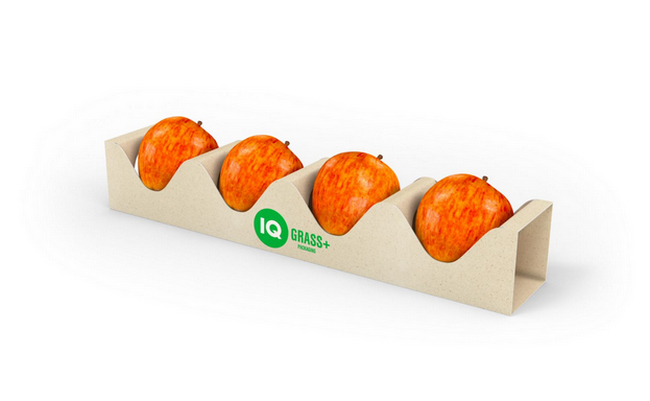
Sustainable forest management
Since it is not possible to recycle paper for an infinite amount of times, the extraction and processing of virgin fibres remains necessary. Cellulose is a sustainable but slowly renewable raw material. It is therefore necessary to create resilient forestry areas in view of changing climate conditions and in harmony with the entire ecosystem.
The challenge of sustainable forest management has been proactively addressed by many players in the paper industry for many years. Manufacturers such as Mondi have therefore been taking cultivation into their own hands for some time and have been focusing on sustainable forest management. For its paper mills around the world, Mondi only uses pulp from forests that are sustainably managed - whether by the company itself or by its partners. Certain third-party certifications, such as FSC® or PEFC™, provide customers with guidance when selecting a sustainable product.
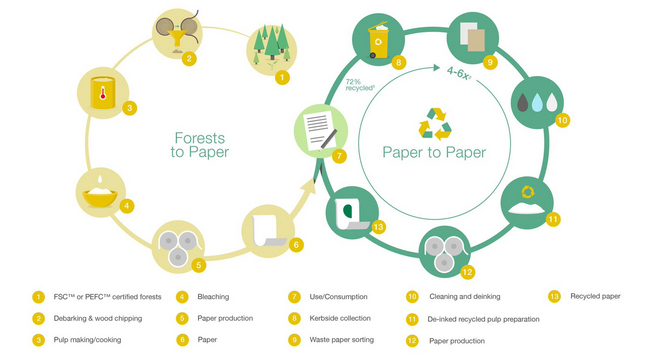
Wood is not the only answer
Grass is currently emerging as a promising alternative and supplement to wood in paper production, as this raw material regrows particularly quickly. It is true that a certain amount of cellulose must still be added to grass paper in order to give the paper the necessary stiffness. Nevertheless, fresh fibre consumption can be reduced by the addition of grass fibers.
For example, Mondi currently uses 30 percent grass fibres in its IQ GRASS+ PACKAGING grass paper. Compared to conventional uncoated fine papers, IQ GRASS+ PACKAGING is significantly more tear-resistant due to the addition of the coarser grass fibre. In addition, the grass paper is optimised for flexo printing processes, which are used particularly for printing of packaging. Thanks to food safety certifications, Mondi's grass paper can be used for packaging like pure cellulose products.
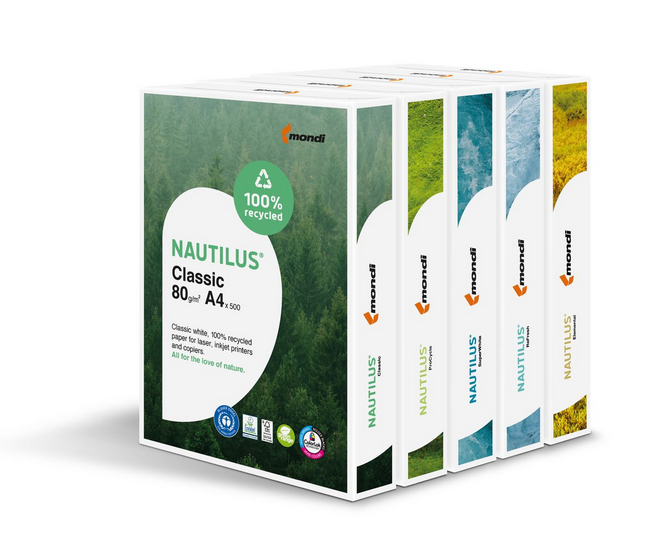
Production as a key factor in energy savings
In addition to the use of rapidly renewable, alternative raw materials, the reduction of greenhouse gas emissions is a crucial step on the way to sustainable paper production. In addition to preserving and promoting CO2-binding ecosystems, paper manufacturers are also focusing on energy efficiency measures and electricity from renewable sources.
Mondi is actively working to reduce the CO2 emissions of its own production and has already implemented savings of 45 percent since 2004. By 2050, the company plans to reduce greenhouse gas emissions by 72 percent compared to 2014 emission levels. On the way to this ambitious climate target, Mondi is relying on biomass as an energy source, among other things, and is investing in the modernisation of its production sites and the improvement of energy efficiency. For these efforts, Mondi in 2020 was one of only ten companies worldwide to be awarded a triple A score by the CDP for its environmental performance in the areas of climate, forest, and water security. In addition, Mondi has been offering almost its entire portfolio from the Austrian Mondi Neusiedler mill as CO2 neutral since April 2021, helping customers to improve their carbon footprint.
Open communication for more sustainability
The paper industry is increasing its efforts to lead paper business into an even more sustainable future. Increased public interest is fueling this shift in thinking. Through providing industry-wide transparency about the way material is sourced, paper manufacturers can also support consumers in their decision-making process. Information about the CO2 neutrality of products on packaging, information material for customers, and also recognised third party certifications such as FSC™, PEFC™ or the EU Ecolabel provide customers with an objective basis for decision-making and support the change in the paper market towards greater sustainability.
Author: Bernhard Cantzler, Head of Marketing & Innovation Mondi UFP
